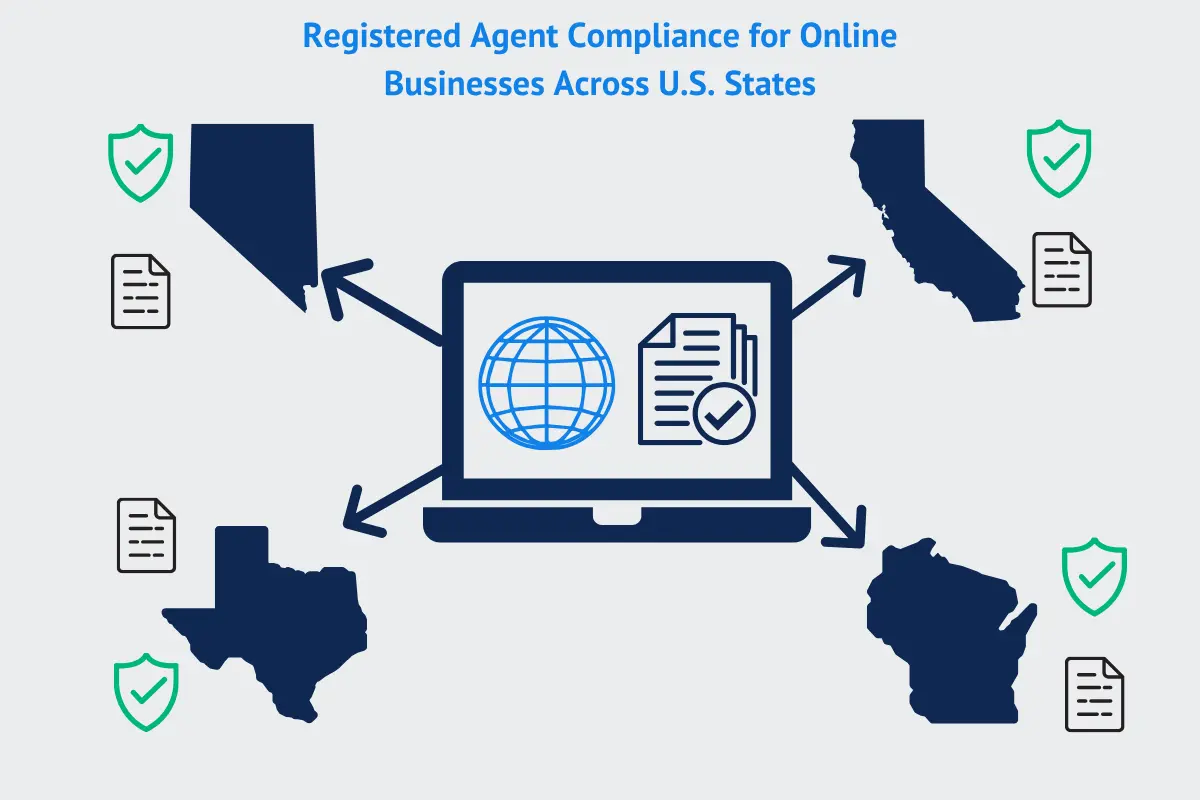Registered Agent Requirements for Online Businesses: Complete Compliance Guide

Many entrepreneurs assume that running a digital business means fewer rules and less red tape. In reality, online businesses must follow the same essential regulations as traditional storefronts. Overlooking these requirements can put your entire operation at risk.
Business owners need to be aware of their legal obligations, especially when it comes to appointing a registered agent. Proper business compliance isn't just a box to check—it's your protection against administrative dissolution, legal penalties, unexpected disruptions, and even potential threats to your business or personal assets if liability protections are lost. Appointing a reliable registered agent is a critical step in maintaining good standing and safeguarding your business's future.
In this article, we'll break down the registered agent requirements every online business must follow, highlight the risks of non-compliance, and show you how the right approach can protect—and even strengthen—your company.
Key Takeaways
-
Registered agents are legally required for all online businesses, just like brick-and-mortar companies
-
Non-compliance can lead to penalties, loss of good standing, or even business dissolution
-
Professional registered agent services offer privacy, convenience and help manage multi-state compliance
-
InCorp provides nationwide coverage, digital tools, and expert support to keep your business protected and compliant
Importance for Online Businesses
Despite not having a brick-and-mortar location, online businesses must comply with the same registered agent requirements as traditional companies. Many digital entrepreneurs are surprised to learn that virtual operations are held to identical standards under industry regulations and business compliance laws. Maintaining a registered agent is crucial for demonstrating your company's compliance with state laws.
Things get more complicated when your company grows and begins serving new customers or conducting business activities in additional states. To comply with local laws, you may need to register as a foreign entity in each jurisdiction, each with its own regulations and filing requirements. For example, you may be required to register if you hire employees in another state, store inventory there, or regularly provide services or meet clients in that state. For each state that you officially register to do business in, you also must have a registered agent in that state. Online entrepreneurs must be aware of their business's legal requirements to ensure ongoing compliance at every stage of their business.
Managing multi-state compliance for online businesses can be overwhelming, but top registered agent service providers like InCorp can help you simplify the process. InCorp has helped thousands of clients navigate complex regulations, filings, and compliance challenges with confidence to protect their good standing and uphold their business reputation.

Legal Requirement for Registered Agents
Most states don't distinguish between online and offline business operations when it comes to registered agent requirements. The U.S. Small Business Administration confirms that "if your business is an LLC, corporation, partnership,, or nonprofit corporation, you'll need a registered agent in your state before you file. A registered agent receives official papers and legal documents on behalf of your company."
Complying with state laws regarding registered agents is essential for all formal business entities. Businesses must also submit the appropriate form to appoint or change a registered agent as required by state authorities.
Getting registered agent service ensures you maintain compliance with these fundamental laws while preserving your business flexibility. It is also necessary to keep your registered agent information up to date to avoid compliance issues and potential penalties.
Universal Requirement Across All U.S. States
All 50 states mandate that LLCs, corporations and other formal business entities designate a registered agent during business entity formation and maintain one throughout the company's existence.
Applies to Both Online and Brick-and-Mortar Businesses
State laws make no distinction between digital and physical business operations. Your registered agent requirements apply whether you're selling through online platforms or operating a traditional retail location.
Role as the Official Point of Contact for the State
Your registered agent serves as the bridge between your business entity and the state government. They are responsible for receiving service of process (official legal notices, such as lawsuits), tax notices, annual report reminders, and other important documents, ensuring your business can promptly respond to legal notices and government correspondence.
Consequences of Failing to Appoint One
States can deny your initial corporate filings, impose ongoing fees and penalties—including a fee for failing to appoint or maintain a registered agent—and ultimately dissolve your business entity, stripping away the legal protections it was created to provide. If your business loses its liability protection, your personal assets could also be at risk.
According to the Texas Secretary of State, "A domestic or foreign filing entity is required to continuously maintain a registered agent and registered office in Texas. Failure to do so may result in the involuntary termination of a domestic filing entity or in the revocation of a foreign filing entity's registration."
Benefits of Using a Professional Registered Agent Service
Professional registered agent service providers offer significant advantages for online business operations. They provide instant digital access to compliance tools and legal documents, making business management more convenient and efficient. Additionally, these services offer enterprise-grade security features to protect your sensitive business information.
Protects Your Privacy
Professional registered agent services protect your privacy by listing their business address—rather than your personal address—in public records. This is especially important for home-based businesses.
According to SCORE, "If you list yourself as your business's registered agent, you'll probably be listing your home address as the business's point of contact. This puts your home address on public record, and anyone who wants to officially contact your business (typically with tons of junk mail) will find your home address. For some people, this is a concern."
Ensures Compliance with State Requirements
Professional agents monitor state regulations and filing requirements, sending reminders for annual report submissions. Also, as noted by the National Crime Prevention Council, maintaining proper business compliance protects against fraud and maintains your entity's good standing.

Maintains Availability During Business Hours
Professional registered agent services maintain consistent availability during required business hours, ensuring important documents and legal papers are always received promptly.
Supports Multi-State Business Operations
As your online business expands into other states, professional registered agent services provide coverage in all necessary jurisdictions, helping you comply with various state regulations. Using a single national service streamlines compliance, centralizes document management, and eliminates the need to hire separate agents or manage multiple vendors as you grow.
Provides Document Management and Forwarding
Modern registered agent services scan and digitally deliver documents immediately upon receipt and also allow you to print copies of important legal documents directly from their platform for added convenience. Legal experts emphasize that promptly managing business documents is essential for keeping your filings up to date and maintaining your company's good standing.
Offers Peace of Mind and Professionalism
Using a professional registered agent service demonstrates business legitimacy and relieves compliance stress, allowing you to focus on serving customers and managing daily operations.
Allows Flexibility in Business Location
Professional registered agents let online business owners operate from anywhere since the agent's address meets state requirements. This means you don't even need a physical business location in your state of registration.
Helps Avoid Missed Legal Notices
Professional registered agents promptly notify you of important legal documents—such as service of process or compliance warnings—so you never miss a critical notice.
Risks of Not Having a Registered Agent
While it may not be the first thing that comes to a business owner's mind, failing to maintain a registered agent can have devastating consequences for an online business. Some business owners choose to fulfill the role themselves, but the risks of being your own registered agent far outweigh any potential benefits. From missed legal notices and compliance deadlines to loss of good standing or even involuntary dissolution, overlooking this critical role can put your entire business at risk.
Loss of Good Standing with the State & Risk of Administrative Dissolution
When businesses fail to maintain a registered agent, most states will place them in "not in good standing" status, which can prevent you from obtaining loans, entering into contracts, or expanding into new markets. If the issue isn't corrected, this status can eventually lead to administrative dissolution.
Missed Legal Documents or Lawsuits
Without a registered agent, your business may miss notice of lawsuits, leading courts to issue default judgments against you. This means the plaintiff can automatically win, resulting in financial damages, asset seizure, or liens against your business, often without your knowledge.
Administrative Dissolution
If your business fails to maintain a registered agent, the state can administratively dissolve your company, stripping away its legal status and liability protection. This means your personal assets may become vulnerable to lawsuits, debts, and other business obligations. You could also lose access to contracts, business licenses, and the ability to defend your company in court.
Exposure to Personal Liability
Administrative dissolution can affect both corporations, LLCs, and other formal business entity types. As the name implies, it dissolves your business entity. This basically puts you on the same playing field as a sole proprietorship: there is no legal difference or separation between you and your company. It's important to emphasize how serious this risk is. When this happens, you lose the liability protection that normally shields your personal assets, and you can become personally liable for business debts and obligations. This means your home, car, or even your savings could be at risk.
Difficulty Reinstating the Business
Restoring a dissolved business entity requires extensive paperwork, paying back fees and penalties, and sometimes losing your original business name. In many states, you must also cure the issues that caused dissolution and act within a limited time frame—often just a few years—or risk losing the ability to reinstate entirely.
Delays in Important Communication
Without a designated contact person, critical government notices about compliance deadlines may be delayed, resulting in additional late fees and missed opportunities. This can include missing reminders about annual reports, tax filings, or license renewals, which can jeopardize your company's good standing or ability to operate.
Protect Your Business with a Trusted Registered Agent Today
Online businesses cannot ignore the fundamental registered agent requirements that apply to all business entities. Professional registered agent services like InCorp provide the reliability, privacy protection, and compliance monitoring that online operations need.
FAQs
Can I act as my registered agent for my online business?
Yes, in most states, you are allowed to be your own registered agent as long as you have a physical address in the state and are available during business hours. However, this can limit your flexibility and drastically increase the risk of missing critical documents, which could lead to fines, loss of good standing, default judgments, or even administrative dissolution of your business.
What happens if I change my business address—do I need to update my registered agent info?
If you use your business address as your registered agent address, then yes, you must update your registered agent info with the state when you move. If you use a registered agent service, their address stays the same, so you don't have to update your registered agent info when your business address changes.
Is a registered agent the same as a business attorney or accountant?
No, a registered agent's role is limited to receiving official documents for your business—they do not provide legal or accounting advice. However, some business attorneys do offer registered agent services in addition to their legal work.
How do I choose the best registered agent service for my online business?
Review registered agent services that offer nationwide coverage, fast digital document delivery, compliance reminders, and responsive customer support. The best services make the process easy by guiding you through a few simple questions to get started, and many also offer business formation, trademark registration, and ongoing compliance services to meet all your business needs in one place.
Can I change my registered agent after forming my LLC or corporation?
Absolutely. You can change registered agents at any time by completing the appropriate paperwork with your state. Many professional services can assist with this transition, though additional fees may apply depending on the provider.
How much does a registered agent cost in Maryland?
Registered agent services in Maryland, like in any other US state, typically cost between $49 and $300 per year, depending on the provider.
What is the difference between a registered agent and a virtual office?
A registered agent receives legal and government documents for your business and is required by law, while a virtual office provides a business address, mail handling, and sometimes access to office amenities. The registered agent is for official notices and compliance, whereas a virtual office is mainly for business mail and a professional image.
Secure Compliance for Your Online Business with InCorp
Running an online business offers incredible opportunity and flexibility, but staying compliant with state-level requirements is essential to protect what you've built, especially as your business grows. InCorp specializes in registered agent services that help digital entrepreneurs navigate the complexities of multi-state operations with ease.
Our multi-year plans can save you money, and our Entity Management System gives you instant access to all your business data, compliance events, and important documents from any location, whether you are at home or on the go. With features like EntityWatch®, you'll receive real-time updates on your business status and added protection against business identity theft.
If you haven't yet registered your business entity, such as an LLC, InCorp can guide you through the process with our business formation services you can also easily sign up for registered agent services during this process. With nationwide registered agent coverage, you can manage your legal requirements no matter where you operate, all while protecting your privacy. Let InCorp handle the paperwork and deadlines so you can focus on growing your business with confidence and peace of mind.
Share This Article:
Stay in the know!
Join our newsletter for special offers.